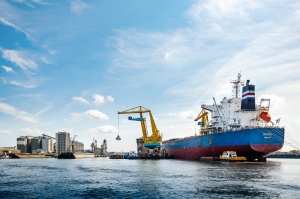


(Posted on 02/05/24)
The Port of Amsterdam’s annual report shows that the port is in transition. While revenues rose to €190.4 million, transhipment fell to 63 million tonnes. This is mainly due to a decline in fossil fuel transhipment.
The Amsterdam port area is a leading player in dry bulk. Be it agribulk, industrial minerals, coal, biomass, iron ore or scrap metal. A significant portion of dry bulk is also processed at the Amsterdam port before being shipped to the European hinterland.
Total transhipment in the Amsterdam port area was 20% lower in 2023 than in 2022. Transhipment of coal fell by as much as 48%, to 7.4 million tonnes in 2023. Together with the coal terminals, the Port of Amsterdam has taken steps towards more non-fossil activities. For example, terrain was taken back from a coal terminal in late 2022. Other activities, such as the transhipment of scrap metal, now take place there. Oil products transhipment also showed a 16% drop to 28.9 million tonnes. This is partly due to the sanctions on oil products from Russia and the ban on exports of high-sulphur fuels from the Netherlands to West Africa.
Contract revenue rose to €115.6 million from €103.6 million the prior year. This reflects higher net issuance and regular price increases. Seaport charges fell by €6.2 million to €54 million in 2023. Inland port charges came to €7.8 million, up from €7.7 million in 2022. Compared to 2022, operating income increased by €39 million in 2023 to €75 million. This is mainly because the final instalment payment of €37.8 million was remitted for the IJmuiden Sea Lock in 2022. The net result amounts to €55.1 million in 2023 compared to €44.4 million in 2022.
Port of Amsterdam CEO Koen Overtoom: ‘In 2023, we stuck firmly to the course of our 2021-2025 strategy. The sustainable change we initiated years ago is now taking concrete shape. Despite geopolitical turmoil, high inflation and a downward economic trend, the port is fully in transition. Also in 2024, we will invest in quays for new and existing customers, install shore power points and make our own fleet more sustainable. This is how we are working to make shipping and the port more sustainable.’
The port of Amsterdam is home to several specialized terminals that handle the shipping, storage and transportation of all types of dry bulk, among other things. The terminals are located next to deep-water quays and have their own transport facilities for rail and inland navigation.
With this year’s Rail Conference “Rail Freight Transport and Seaports”, a joint initiative... Read more
Asian Bulk Logistics (ABL Group) and ICG have jointly announced the successful completion of ABL&rsquo... Read more
Abu Dhabi based AD Ports Group, a leading global enabler of integrated trade, industry and logistics... Read more
The Executive Board of Hamburger Hafen und Logistik AG (HHLA) has appointed Patrick Krawutschke as Managing... Read more
Abu Dhabi based AD Ports Group, a global enabler of integrated trade, transport, industry, and logistics... Read more
This year marks a significant milestone in maritime innovation as Port Hedland, Australia, celebrates... Read more
Associated British Ports (ABP), the UK’s leading port operator, has announced the latest tranche... Read more
During the Investment, Labour, and Trade Promotion Programme in Japan (November 16–22, 2025),... Read more
AD Ports Group subsidiary Khalifa Economic Zones Abu Dhabi - KEZAD Group, the largest operator of integrated... Read more
Abu Dhabi based AD Ports Group, a global enabler of integrated trade, transport, industry, and logistics... Read more